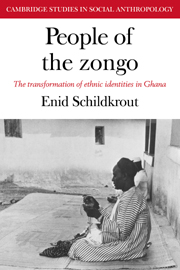Book contents
- Frontmatter
- Contents
- List of tables, figures, and maps
- Preface
- Glossary
- I Ethnicity and migration
- II Kinship and community
- 4 The growth of the zongo community in Kumasi
- 5 Ethnicity and the domestic context
- 6 Ethnicity and the idiom of kinship
- 7 Kinship and marriage in the second generation
- III Politics and change
- Notes
- Bibliography
- Index
7 - Kinship and marriage in the second generation
Published online by Cambridge University Press: 29 October 2009
- Frontmatter
- Contents
- List of tables, figures, and maps
- Preface
- Glossary
- I Ethnicity and migration
- II Kinship and community
- 4 The growth of the zongo community in Kumasi
- 5 Ethnicity and the domestic context
- 6 Ethnicity and the idiom of kinship
- 7 Kinship and marriage in the second generation
- III Politics and change
- Notes
- Bibliography
- Index
Summary
The extensive use of the idioms of kinship and affinity among first-generation urban immigrants is intrinsically involved with affirming the significance of ethnic identity. Moreover, as the discussion in chapter 6 suggests, it is the persistence of the ideology of unilineal descent among most northern immigrants which makes this idiom so appropriate for generating corporate ethnic categories in town.
Individuals can claim eligibility in the same ethnic category on the basis of common paternal ancestry; and some ethnic categories are related, affinally, because of putative marriages between their founders. Other ethnic categories in town are not related to each other in this way at all, and some do not emphasize unlineal descent as a principle of inclusion. But those which do - those with a traditionally strong emphasis on this principle - conceive of the relationships between certain ethnic categories in terms of affinity, while relationships within the ethnic community are conceptualized as though they were relations between agnates. It is a person's ethnic identity, based on descent, that determines the possibility of activating such generalized affinal and agnatic ties.
What I have referred to earlier as specific kinship differs from this in the urban context, in that there is less emphasis on unilineal descent. Although ethnic identity is still primarily determined by patrifiliation, for the immigrant Mossi the ideology of unilineal descent does not lead to corporate kinship groupings in the sense of joint residential or propertyowning groups.
- Type
- Chapter
- Information
- People of the ZongoThe Transformation of Ethnic Identities in Ghana, pp. 161 - 190Publisher: Cambridge University PressPrint publication year: 1978



